|
|
|
Sort Order |
|
|
|
Items / Page
|
|
|
|
|
|
|
| Srl | Item |
| 1 |
ID:
181815


|
|
|
|
|
| Summary/Abstract |
Although the popular protests that swept across the Middle East and North Africa in 2011 were short-lived, their long-term consequences are still resonating through the region a decade after their outbreak. Islamist movements have been affected in different ways by the drastic change in the political, social and geographical contexts in which they historically operated, highlighting the need for a renewed examination of these changed circumstances. Based on the case study of the Egyptian Muslim Brotherhood, we argue that three key factors need to be accounted for when studying Islamist movements in the aftermath of the 2011 uprisings. These are the dimension of exile; the increased role played by women and youth; and the emergence of cross-generational and cross-ideological alliances. The article analyzes these three factors through a comparative study of responses by Muslim Brotherhood and Muslim Sisterhood members to repression across Egypt, Turkey and the UK.
|
|
|
|
|
|
|
|
|
|
|
|
|
|
|
|
| 2 |
ID:
189247
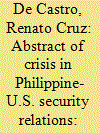

|
|
|
|
|
| Summary/Abstract |
This article explores the prospect of transforming the Philippine-U.S. alliance into a security partnership. In the past, the Philippines doubted the U.S.’s often-repeated commitment to assist its ally because the 1951 Philippine-U.S. Mutual Defence Treaty (MDT) merely stipulated consultation rather than an automatic armed response in case of an armed conflict. In mid-2011, the Aquino Administration asked for an unequivocal U.S. guarantee to defend the Philippines and its naval/air units deployed in the Spratlys. The Duterte Administration, however, has expressed its uncertainty over America’s willingness to back the Philippines militarily in any confrontation with China over the disputed maritime territory. Early this year, President Rodrigo Duterte commented that an armed clash in the South China Sea would crush the Philippines because the involvement of American forces would make the conflict spiral out of control. This development, along with his decision to abrogate the 1997 Philippine-U.S. Visiting Forces Agreement (VFA), has generated a crisis in the alliance. To avert any break-down in their overall security relations, the two allies can explore the possibility of downgrading their alliance to a security partnership. In conclusion, the article argues that should the Philippines consider this option, it must take into account the following: the consequence of losing the deterrence effect of a defence treaty with the world’s most powerful nation; the impact on Philippine defence spending; on the ongoing Armed Forces of the Philippines’ (AFP’s) modernisation program; and whether or not the Filipino nation will support this move.
|
|
|
|
|
|
|
|
|
|
|
|
|
|
|
|
| 3 |
ID:
148531
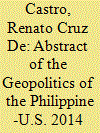

|
|
|
|
|
| Summary/Abstract |
This article examines the geostrategic implications of the 2014 Philippine-U.S. Enhanced Defense Cooperation Agreement (EDCA) in terms of U.S. utilization of the five agreed locations in the Philippines. The Philippines negotiated this pact because of its limited defense capabilities and China`s heavy-handed handling of the 2012 Scarborough Shoal stand-off. The two allies discussed the terms and conditions from September 2013 to March 2014 and signed the agreement in late April 2014. In January 2016, the Philippine Supreme Court ruled in favor of the EDCA setting in motion the deployment of American forces in the Philippines. Currently, the U.S. Air Force (USAF) maintains a small contingent of aircraft and personnel in Philippine territory. This presence in five Philippine Air Force (PAF) bases marks the return of U.S. airpower which can be projected deep into China`s near sea defense zone. Only time will tell if the allies can fully develop a formidable deterrent posture to constrain China`s expansionist moves in the South China Sea.
|
|
|
|
|
|
|
|
|
|
|
|
|
|
|
|
| 4 |
ID:
152414
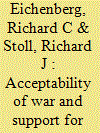

|
|
|
|
|
| Summary/Abstract |
We study the factors that influence citizen support for defense spending in fourteen democracies over the period 2004–2013. We pose two research questions. First, what factors influence citizen support for war and military force? We refer to this as the acceptability of war. Second, in addition to the acceptability of war, what other factors affect support for defense spending? Our principal finding is that citizen acceptance of war and support for defense spending are most influenced by basic beliefs and values. Gender also has a strong negative influence on attitudes toward war and thus indirectly lowers support for defense spending among women. Attitudes toward war and defense spending are also sometimes influenced by short-term threats and by alliance considerations, but the effects are not as substantively meaningful. We conclude with a summary of the results and a discussion of the implications for theory and policy.
|
|
|
|
|
|
|
|
|
|
|
|
|
|
|
|
| 5 |
ID:
084191
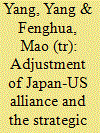

|
|
|
| 6 |
ID:
165209
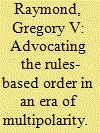

|
|
|
|
|
| Summary/Abstract |
Faced with eroding United States hegemony and the rise of a more multipolar distribution of global power, Australia has embraced a new foreign policy platform built around advocacy for a ‘rules-based global order’. In this essay I first argue that the emerging characterisation of multipolarity overemphasises the centrality of the United States and overlooks the legacies of Asian colonisation, decolonisation, state-building and local norm development. I then consider the reasons for the embrace of the rules-based global order construct, locating it as an instinctive reaction to issues arising from the South China Sea dispute, the raw use of power, and the inclination to share the ideas of a close ally. I note, however, that linking Australia closely with the United States approach to global rules has drawbacks, given the United States’ explicit attempts to reserve a right to use force outside the UN Charter. I suggest that Australia would be better served by clearly delineating a separation between its military alliance with a United States, a policy for worst-case scenarios, from its support for international law and institutions, which should form the mainstay and leading edge of its foreign policy.
|
|
|
|
|
|
|
|
|
|
|
|
|
|
|
|
| 7 |
ID:
159425
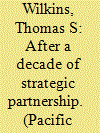

|
|
|
|
|
| Summary/Abstract |
This article argues that the creation of ‘strategic partnerships’ as an alternative form of alignment represents an effort by Tokyo, and other US-allies, to ‘decenter’ their respective security policies from their erstwhile over-dependence on Washington. By examining the nature, purpose, and dynamics of strategic partnerships more closely, and investigating the empirical case of Australia, we can gain a greater appreciation of their significance both to Japan's evolving security policy and the broader role they play in the Asia Pacific security landscape. The article argues that Australia has been the most significant and successful of Japan's new strategic partnerships to date, has therefore come to represent the template for other new alignments, and hence provides a yardstick against which their effectiveness can be measured. It concludes that while the strategic partnership certainly represents a new departure for Japanese security policy – ostensibly independent of the US-alliance – closer inspection reveals how this relationship remains fundamentally bound to the broader American-hub-and-spokes system.
|
|
|
|
|
|
|
|
|
|
|
|
|
|
|
|
| 8 |
ID:
172381
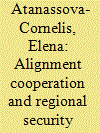

|
|
|
|
|
| Summary/Abstract |
Although the US-led system of formal alliances remains the main pillar of the regional security architecture in Asia, alignment cooperation – centred on the Indo-Pacific maritime conceptualisation of the region – has been on the rise. This includes informal bilateral and minilateral agreements for security collaboration between regional and extra-regional US treaty allies or close security partners, notably Japan, Australia, India, the United Kingdom and France. While the various alignments complement and address the deficiencies of the formal US-led alliances, the functional and informal characteristics of alignments allow countries to pursue security cooperation both in conjunction with the United States and independently of it. This leads to a more fluid security architecture that increasingly reflects the diversity of emerging regional ‘architects’, among which Japan is assuming a leading role, as much as the region’s array of new security challenges.
|
|
|
|
|
|
|
|
|
|
|
|
|
|
|
|
| 9 |
ID:
147314
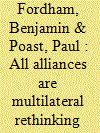

|
|
|
|
|
| Summary/Abstract |
Alliance formation is a multilateral process. The vast majority of alliance relations are created via multilateral alliances. Moreover, leaders assess the alliance as a whole, not just each prospective partner. Any alliance could have three or more members, so one must understand not just why third parties were included in multilateral alliances, but why they were excluded from bilateral alliances. Unfortunately, current research treats alliance formation as a bilateral process: it theorizes about bilateral alliances and tests hypotheses using dyadic research designs. Reconceptualizing all alliances as originating from a multilateral process reveals that a long-neglected theory, William Riker’s size principle, illuminates the role of power in alliance formation. Using k-adic data to analyze multilateral processes, we find strong support for Riker’s claim about minimum winning coalitions in world politics. Our argument and findings, by highlighting how a fundamental state behavior like alliance formation follows a multilateral process, suggest rethinking much of international relations research.
|
|
|
|
|
|
|
|
|
|
|
|
|
|
|
|
| 10 |
ID:
145401
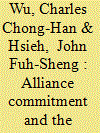

|
|
|
|
|
| Summary/Abstract |
Our study shows that alliance commitment is the key to the maintenance of the status quo between a weak challenger and a major-power attacker. In order to verify our theory, we employ data from Benson's typology of compellent military alliances and conduct empirical tests for our theoretical hypothesis. The statistical results comply with the theory, indicating that a trustful and strong military commitment creates negative effects on the status quo. We examine the cases of the Korean War and US-China-Taiwan relations to buttress our arguments. The latter case also shows the need to modify our original model under certain conditions.
|
|
|
|
|
|
|
|
|
|
|
|
|
|
|
|
| 11 |
ID:
014899
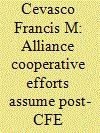

|
|
|
|
|
| Publication |
Oct 1990.
|
| Description |
41-48
|
|
|
|
|
|
|
|
|
|
|
|
|
|
|
|
| 12 |
ID:
131823
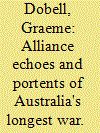

|
|
|
|
|
| Publication |
2014.
|
| Summary/Abstract |
Afghanistan was Australia's longest war, yet the consensus between Australia's major political parties on the commitment never wavered over 12 years. The bipartisan unity held even as the nature of the war changed and evolved, Australian casualties rose and popular support fell away. The enduring centrality of the US alliance explains much-probably almost all you need to know-about the unbroken consensus of the Australian polity. Afghanistan was an example of the Australian alliance addiction, similar to Vietnam. As with Vietnam, the Australian military left Afghanistan believing it won its bit of the war, even if the Afghanistan war is judged a disaster. As Australia heads home it finds the USA pivoting in its direction; with all the similarities that can be drawn between Vietnam and Afghanistan, this post-war alliance effect is a huge difference between the two conflicts.
|
|
|
|
|
|
|
|
|
|
|
|
|
|
|
|
| 13 |
ID:
014963
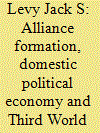

|
|
|
|
|
| Publication |
Dec 1992.
|
| Description |
19-40
|
|
|
|
|
|
|
|
|
|
|
|
|
|
|
|
| 14 |
ID:
189959
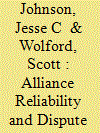

|
|
|
|
|
| Summary/Abstract |
States form defensive alliances hoping to deter adversaries and avoid war. However, scholars and policy analysts often worry that if an alliance fails to deter the promise of military support will encourage escalation, pushing disputants closer to war. We show that in many cases this concern is unwarranted. We use a game-theoretic model of alliance reliability and crisis bargaining to show that the same factors that indicate unreliability and provoke disputes also encourage alliance members to make concessions rather than risk war. We test this hypothesis using a sample of militarized disputes initiated against members of defensive alliances, where recent shifts in military capabilities represent changes in challengers’ estimates of alliance reliability. Less-reliable alliances are less likely than reliable allies to deter disputes, but they also decrease the probability of escalation relative to reliable alliances. Unreliable alliances need not encourage war; rather, they can discourage it.
|
|
|
|
|
|
|
|
|
|
|
|
|
|
|
|
| 15 |
ID:
076956
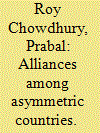

|
|
|
|
|
| Publication |
2007.
|
| Summary/Abstract |
We examine alliances between asymmetric countries. We find that the results depend on the nature of the equilibrium. If the equilibrium is an interior one then, with an increase in asymmetry, the level of the alliance-wide defense good decreases and the divergence between the first best and the equilibrium level of the defense good increases. In the case where the equilibrium involves a corner solution, these results are reversed. It may be argued, however, that the interior equilibrium case is the more relevant one.
|
|
|
|
|
|
|
|
|
|
|
|
|
|
|
|
| 16 |
ID:
014849
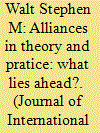

|
|
|
|
|
| Publication |
Summer/Fall 1989.
|
| Description |
1-17
|
|
|
|
|
|
|
|
|
|
|
|
|
|
|
|
| 17 |
ID:
014853
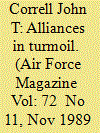

|
|
|
|
|
| Publication |
Nov 1989.
|
| Description |
36-40
|
|
|
|
|
|
|
|
|
|
|
|
|
|
|
|
| 18 |
ID:
165094
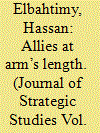

|
|
|
|
|
| Summary/Abstract |
This article examines Egyptian–Soviet relations in the run up to the 1967 Arab–Israeli war. It argues that Egypt and the Soviet Union stumbled into brinkmanship with little coordination and no agreement on common objectives or goals. The article demonstrates how frustration and mutual disappointment were recurring features of the interactions between the two allies during the critical weeks prior to the war. In doing so, the article exposes new aspects of how Cairo and Moscow managed their alliance and assesses what that means to our understanding of the origins of this transformative war. These conclusions challenge revisionist accounts that attribute the start of the war to Egyptian–Soviet collusion and some traditional narratives that present the Soviet Union as an enterprising risk-taker invested in regional brinkmanship. The article draws heavily on Egyptian and Arabic language sources to examine Egyptian–Soviet interactions during this key period of Middle Eastern history.
|
|
|
|
|
|
|
|
|
|
|
|
|
|
|
|
| 19 |
ID:
014898
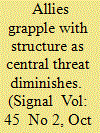

|
|
|
|
|
| Publication |
Oct 1990.
|
| Description |
30-33
|
|
|
|
|
|
|
|
|
|
|
|
|
|
|
|
| 20 |
ID:
065128
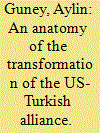

|
|
|
|
|
|
|
|